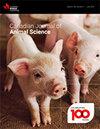Effects of soybean oil plus additional forage and anabolic implant in finishing steers: feedlot performance, carcass composition, and meat quality
IF 1
4区 农林科学
Q3 AGRICULTURE, DAIRY & ANIMAL SCIENCE
引用次数: 1
Abstract
Abstract One hundred twenty crossbred steers were allotted to six weight blocks. Within each block, steers were allotted to one of four pens in a randomized complete block design (5 head per pen, 24 total pens). Treatments were low forage control diets (LFC) or high forage diets supplemented with soybean oil (HFO), without or with anabolic implant in 2 × 2 factorial arrangement. As compared with LFC, HFO reduced dry matter intake and average daily gain, without affecting the gain:feed ratio. Feeding HFO also decreased dressing yield and backfat thickness, with no impact on the longissimus dorsi area and Warner-Bratzler shear force. Meat from steers fed HFO contained greater relative proportion of cis-9, cis-12 18:2, cis-9, trans-11 18:2, and cis-9, cis-12, cis-15 18:3 as compared with LFC. Implanted steers had greater dry matter intake, average daily gain, and gain:feed ratio. Implants improved dressing yield, tended to increase the longissimus dorsi area, decreased backfat thickness, and increased meat Warner-Bratzler shear force. Meat from implanted steers contained greater relative concentration of cis-9, cis-12 18:2 and cis-9, cis-12, cis-15 18:3, without affecting cis-9, trans-11 18:2, as compared with non-implanted animals. No interaction of diet by implant was observed for these variables.大豆油加额外饲料和合成代谢植入物对肥育阉牛的影响:饲养场生产性能、胴体组成和肉品质
摘要120头杂交公牛被分配到六个重量块。在每个区块内,在随机完全区块设计中,将公牛分配到四只围栏中的一只(每只围栏5头,总共24只)。处理为低饲料对照日粮(LFC)或添加大豆油(HFO)的高饲料日粮,不添加或添加合成代谢植入物,按2×2因子排列。与LFC相比,HFO降低了干物质摄入量和平均日增重,而不影响增重与饲料比。喂入HFO也降低了敷料产量和背面厚度,但对背最长肌面积和Warner-Bratzler剪切力没有影响。与LFC相比,喂食HFO的牛的肉含有更大比例的顺-9、顺-12 18:2、顺-9、反-11 18:2和顺-9、逆-12、顺-15 18:3。种植公牛的干物质摄入量、平均日增重和增重与饲料比更大。植入物提高了敷料产量,有增加背最长肌面积的趋势,减少了后掌厚度,并增加了肉的Warner-Bratzler剪切力。与未植入的动物相比,植入公牛的肉含有更高的顺-9、顺-12 18:2和顺-9、逆-12、顺-15 18:3的相对浓度,而不影响顺-9、反-11 18:2。对于这些变量,未观察到植入物与饮食的相互作用。
本文章由计算机程序翻译,如有差异,请以英文原文为准。
求助全文
约1分钟内获得全文
求助全文
来源期刊

Canadian Journal of Animal Science
农林科学-奶制品与动物科学
CiteScore
2.30
自引率
0.00%
发文量
51
审稿时长
6 months
期刊介绍:
Published since 1957, this quarterly journal contains new research on all aspects of animal agriculture and animal products, including breeding and genetics; cellular and molecular biology; growth and development; meat science; modelling animal systems; physiology and endocrinology; ruminant nutrition; non-ruminant nutrition; and welfare, behaviour, and management. It also publishes reviews, letters to the editor, abstracts of technical papers presented at the annual meeting of the Canadian Society of Animal Science, and occasionally conference proceedings.
 求助内容:
求助内容: 应助结果提醒方式:
应助结果提醒方式:


